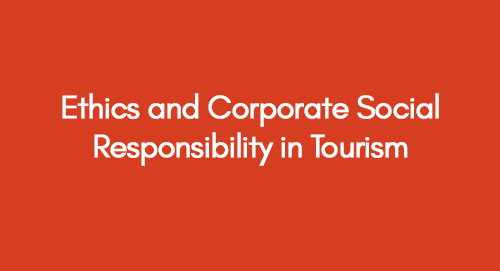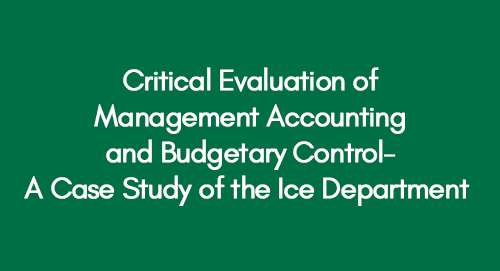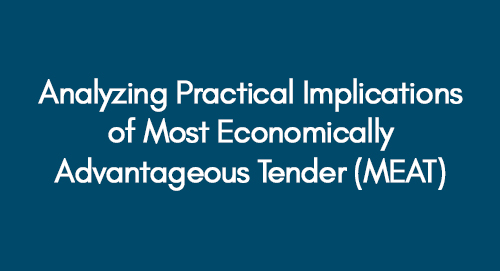
Ethics and Corporate Social Responsibility in Tourism
June 2, 2022
Critical Evaluation of Management Accounting and Budgetary Control- A Case Study of the Ice Department
June 2, 2022 Download PDF File
Download PDF File
Studying Most Economically Advantageous Tender (MEAT) means looking at how it saves money and affects how things get done. Knowing MEAT's importance shows how it can help spend wisely and consider quality in buying things.
The following texts are related to the background of the study.
Contextual Background
MEAT (Most Economically Advantageous Tender) is referred to as an assessment method that is used for the selection procedure. In this procedure, the contracting party is awarded a contract based on all factors related to tender submission, not just price. MEAT was introduced in January 2014 by the European Parliament.
The European Union Procurement Directives proposed the public procurement rules to be applied to public purchases as these were the thresholds for The Public Contracts Regulations (Designingbuildings.co.uk, 2019). The characteristics included in the assessment of MEAT are quality, technical merit, price, accessibility, aesthetic and functional characteristics, after-sales service, delivery conditions, and environmental and social characteristics.
Significance of Procurement Methods in Project Management
Some major factors include the social value of contracts to be considered by contracting authorities (Constructionprocurement.gov.ie, 2011). There is a Social Value Act, according to which contracting authorities prioritize well-being and social considerations over price, achievements in delivery are identified as sustainable only if the social value is considered in service contracts (Knowhow.ncvo.org.uk, 2019). Sustainability is a new buzz in the 21st century in the construction sector. The rise in zero carbon buildings and preference for sourcing labour and materials by considering considerate constructors scheme is in process, and that is why the question has emerged whether the contractor selection processes consider sustainability as an essential factor when awarding work to construction clients for construction procurement (Geach, 2016).
The following text comprises the research aim and objectives.
Research Aims and Objectives
The heading below pertains to the study's aim.
Study Aim
The study aims to assess the importance of social value and sustainability by identifying the potential implications of MEAT in the construction procurement business and to assess the shift of lowest price tender to MEAT (Most Economically Advantageous Tender) award contractor selection.
Objectives
- To identify historical nuances of social value and the factors driving social value and sustainability.
- To critically analyze MEAT and identify its positive and potential impact on the practices of contractors in the future for the construction industry.
- To assess the benefits of MEAT for industry practitioners through the procurement process for a more sustainable future.
- To identify the shift of lowest pricing awarding to MEAT awarding in the construction industry.
- To provide recommendations on how social value and sustainability can be increased in construction by potential implications of MEAT.
Research Problem
Contracting in general or in the MEAT (Most Economically Advantageous Tender) award mechanism has been applied in several projects, and many projects have been successful under this mechanism. However, many of the procurement procedures in the construction industry are still reluctant to apply the MEAT mechanism as they face some uncertainties and difficulties in the MEAT mechanism. Furthermore, the competition in price has created an environment that does not empower sustainable behavior (de Nooij, 2019). The scope of this study is to analyze the impact of potential implications of MEAT through the procurement process in construction by considering sustainability and social value.
Research Significance
The research will be significant for future researchers as a wide literature gap identifies the potential MEAT implications, specifically in the construction sector. It will also benefit the public and private construction industries to evaluate their social value and sustainability procurement processes.
Literature Review
The procurement of road infrastructure is required by the public authorities to be well-functioned. According to the author, the pressure has increased more and more for the infrastructure to be sustainable in recent years. For this reason, an award method of MEAT evaluation has been developed where, in contract awarding, the role of quality is also as essential as price. A shift has been observed in MEAT (Most Economically Advantageous Tender) awarding from lower price awarding, but sustainability enhancement needs to be significantly enhanced in infrastructure projects. The research has explored whether the inclusion of LCA (Life Cycle Assessment) is feasible in tenders or not to influence sustainability and the interpretations of procurers in CO2 gas reductions for sustainability (de Nooij, 2019).
Significance of Project Management
Another study has identified the lack of implementation of the MEAT mechanism as it is identified complicated than a traditional process. It has evaluated the best suitable mechanisms of MEAT for the Dutch construction industry. An empirical approach has been implied to answer the research question by investigating several MEAT types and these all are evaluated based on the value price model, the results presented that a system based on a high-value price ratio is preferred for a suitable MEAT implication Dutch construction industry (Dreschler, 2009).
The following text comprises the methodology of the study.
Research Methodology
The research will be analyzed using mixed methods to analyze the research questions.
Mixed Methods
In mixed methods, the researchers within the same study analyze both qualitative and quantitative data types (Shorten and Smith, 2017). The quantitative approach emphasises objective measurements as the data is collected through primary sources such as surveys, polls, or questionnaires (Nardi, 2018). In contrast, an approach of collecting information by gathering data through open-ended or conversational communication is known as the qualitative approach (Polkinghorne, 2005). Mixed methods research is effective as it provides potential strengths by evaluating results from both data collection methods, qualitative and quantitative (Shorten and Smith, 2017).
Data Collection
This research will be carried out using mixed methods. Questionnaires will conduct primary data collection, and secondary data will be collected through interviews with the related respondents for the study. The data will be collected by a diverse group of public construction organizations, private developers, and main contractors.
Data Analysis
Data analysis will be performed using the method of thematic analysis since the data collection will be through mixed methods. In this study, data will be analyzed using the SPSS software, a real-time and helpful tool to evaluate the questionnaires. Thematic analysis is effective in mixed methods research as it enables the evaluation of data analyzed through statistical tools.......
Review the following:
Research Limitation
The research is limited to the construction sector and the number of interviews. Also, the research has been conducted only through primary data as the literature available for the relevant topic is very limited.
Review the ethical considerations of the study.
Ethical Considerations
Interviews will be conducted by getting informed consent from the respective construction organizations to participate in the research study. Furthermore, confidential information related to construction firms or main contractors will be hidden for ethical purposes. Also, the interview questions will be close-ended to respect the interviewees' privacy.
Drop us a message on WhatsApp or by Email if you want to access the complete report of the above article. We will get back to you within 24 hours.
References
Constructionprocurement.gov.ie. (2011). Procurement Process for Works Contractors. [Online] Available at: https://constructionprocurement.gov.ie/wp-content/uploads/GN-2.3-v1.1-26-05-11.pdf [Accessed 28 Jan. 2020].
De Nooij, R.R., 2019. I am using Life Cycle Assessment in tenders to enhance the sustainable procurement of road infrastructure.
Designingbuildings.co.uk. (2019). Most Economically Advantageous Tender (MEAT). [Online] Available at: https://www.designingbuildings.co.uk/wiki/Most_Economically_Advantageous_Tender (MEAT) [Accessed 28 Jan. 2020].
Dreschler, M., 2009. Fair competition How to apply the ‘Economically Most Advantageous Tender’. EMAT) award mechanism in the Dutch construction industry, PhD thesis at the Technical University of Delft.
Geach, I., 2016. Investigating the Role of Sustainability in Contractor Selection and Evaluation.
Knowhow.ncvo.org.uk. (2019). Social value in commissioning and procurement — NCVO Knowhow. [Online] Available at: https://knowhow.ncvo.org.uk/funding/commissioning/procurement/importance-of-social-value-to-commissioning-and-procurement [Accessed 28 Jan. 2020].
Nardi, P.M., 2018. Doing survey research: A guide to quantitative methods. Routledge.
Polkinghorne, D.E., 2005. Language and meaning: Data collection in qualitative research. Journal of Counseling Psychology, 52(2), p.137.
Shorten, A. and Smith, J., 2017. Mixed methods research: expanding the evidence base.
Get 3+ Free Dissertation Topics within 24 hours?





 Download PDF File
Download PDF File








